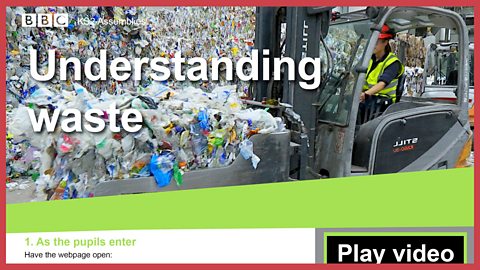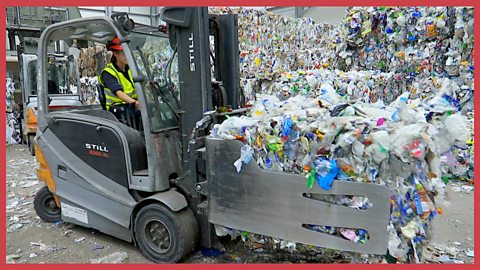In short...
Themes: understanding what happens to waste; recycling; caring for the planet.
Summary: in the UK each person creates about 400kg of waste every year. Some of that waste can be recycled, but much of it goes to landfill which is bad for the environment. Each of us can help reduce waste going to landfill by ensuring we recycle as much waste as possible.
Resources: the and an image of .

The video
Every person in the UK produces about 400kg of domestic waste each year - equivalent to the weight of a grand piano! Waste that cannot be recycled goes to landfill - but landfill is clearly bad for the environment. Waste that can be recycled is processed in special plants. In the video a group of teenagers visit a recycling plant to find out about the work that goes on there. The plastic, glass and paper leaving the plant can be turned into new containers, bottles and paper products.
Each of us has a role to play in reducing the amount of waste that goes to landfill by recycling as much as possible.
Duration: 3' 57"
End of speech: 'β¦and protect the environment.'
Video questions
- How much waste does each person in the UK produce each year? (400kg)
- What happens to waste that cannot be recycled? (It goes to landfill)
- Why is landfill bad for the environment? (The reasons given in the video are: they take up a lot of space, they may contain toxic chemicals, they give off harmful gases. You may have other reasons also.)
- What jobs do the teenagers do at the recycling plant? (First - separating the recycling into categories: cardboard, plastic, mixed metals, paper. Finally - picking the last remnants of plastic from the cardboard recycling.)
- What new things can be made from the recycled waste? (Glass - new bottles, etc; metal - tins, etc; Plastic - new plastic bottles and containers, etc; Paper - new paper)

Key links
Download / print the assembly framework ready for use

Click to display the image full-size


Suggested framework
1. Entry musicA song about the environmentβ¦or the instrumental version of 'All things bright and beautiful' (see 'Related links').
2. Introduction'Every day we all produce a lot of waste: wrappers for food and sweetsβ¦empty packagingβ¦things that we no longer want. What happens to all that waste when we throw it away? Today we'll be trying to understand waste better by thinking about where all the waste we produce goesβ¦and what effect this has on the environment. We're going to start by watching a short videoβ¦'
3. The videoPlay the video. The duration is 3' 57" and the final words are: 'β¦and protect the environment.'
4. After the videoUse the 'Video questions' (right) to help pupils recall the details of the video: 1. How much waste does each person in the UK produce each year? 2. What happens to waste that cannot be recycled? 3. Why is landfill bad for the environment? 4. What jobs did the teenagers do at the recycling plant? 5. What new things can be made from the recycled waste?
5. Time to talk'400kg of waste produced every year by each and everyone one of us - the equivalent of a grand piano! What a lot of rubbish that is! Turn to the person next to you and tell them about the type of waste you collect at home and the different bins that you use.' [Allow time]. 'Why do you think it's right that we recycle? Tell the person next to you.' [Allow time and then invite some responses].
6. Opportunity to singAn opportunity to sing your chosen song. Suggestions from ΒιΆΉΤΌΕΔ collections below.
7. Opportunity to reflectFocus your reflection on the theme of sustainability, protecting the environment and thinking about our waste more carefully. 'Think about the different types of rubbish you create - at homeβ¦at schoolβ¦elsewhere. Do you always try to recycle it? Do you always use the correct recycling binsβ¦at home and at school? If we all try to think carefully about not being wasteful and trying to recycle the waste that we do produceβ¦we can all play a part in protecting our precious environment. What things could you do today to make a positive difference for our planetβ¦?'
8. Opportunity for prayerBegin with your usual form of address ('Dear God', 'Lord Jesus', 'Let us prayβ¦' etc) and: 'We want to thank you for our environment and the world we live in. Help us to think more carefully about the waste that we produce. Encourage us to recycle and take care of our environment for the future. Amen.'

Suggested songs
All things bright and beautiful (vocal)
All things bright and beautiful, All creatures great and small, All things wise and wonderful, The Lord God made them all.
- Each little flowβr that opens, Each little bird that sings, He made their glowing colours, He made thier tiny wings:
Chorus
- The purple-headed mountain, The river running by, The sunset and the morning, That brightens up the sky:
Chorus
- The cold wind in the winter, The pleasant summer sun, The ripe fruits in the garden, He made them everyone:
Chorus
- He gave us eyes to see them, And lips that we might tell How great is God Almighty Who has made all things well:
Chorus
All things bright and beautiful - backing track
All things bright and beautiful, All creatures great and small, All things wise and wonderful, The Lord God made them all.
- Each little flowβr that opens, Each little bird that sings, He made their glowing colours, He made thier tiny wings:
Chorus
- The purple-headed mountain, The river running by, The sunset and the morning, That brightens up the sky:
Chorus
- The cold wind in the winter, The pleasant summer sun, The ripe fruits in the garden, He made them everyone:
Chorus
- He gave us eyes to see them, And lips that we might tell How great is God Almighty Who has made all things well:
Chorus
Chain of love - Vocal
(Verse 1)
For the children of tomorrow
Weβve got to make it a better place,
Fill the world with love and laughter,
Make a fresh start for the human race.
(Chorus(
Chain of love, chain of love,
Circle the world with a chain of love,
Chain of love, chain of love,
Circle the world with a chain of love.
(Verse 2)
No more war and no more hunger,
No more jealousy and hate,
Say goodbye to greed and sadness,
Make a change now or it will be too late.
(Chorus)
Chain of love, chain of love,
Circle the world with a chain of love,
Chain of love, chain of love,
Circle the world with a chain of love.
(Middle eight)
Circle the world, circle the world,
Circle the world, circle the world.
(Verse 3)
Doesnβt matter where you come from,
Doesnβt matter where youβve been,
Different race or creed or colour,
We are the same underneath our skin.
(Chorus)
Chain of love, chain of love,
Circle the world with a chain of love,
Chain of love, chain of love,
Circle the world with a chain of love.
Circle the world with a chain of love.

Related links
